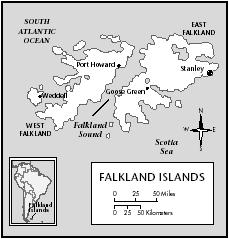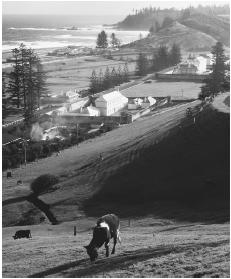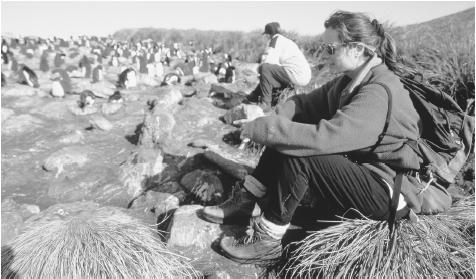Falkland Islands
Culture Name
Falklander
Orientation
Identification. The British named the two islands after the naval officer Viscount Falkland.
Location and Geography. The Falklands, located approximately 185 miles (480 kilometers) east of Argentina, consist of two main islands, East Falkland and West Falkland, and over two hundred smaller islets. The combined area is 4,700 square miles (12,170 square kilometers). The terrain is mainly hilly to mountainous grassland. Shrubs abound, but there are no native trees. An impressive diversity of animal life includes elephant seals, sea lions, penguins, and other birds.
Demography. As of the year 2000, there was a population of 2,826 permanent residents, of whom 1,750 lived in the capital, Stanley. The majority are of British descent, although there are a few immigrants from South America, Chile in particular. At any given time, there are about two thousand British military personnel.
Linguistic Affiliation. English is both the official language and the language of daily life.
Symbolism. The coat of arms, which appears on the flag, contains a representation of the sailing ship Desire, which was the first to reach the islands, and a white ram symbolizing shepherding, the industry on which the economy was built.
History and Ethnic Relations
Emergence of the Nation. It is thought that Patagonian Indians may have reached the islands by canoe, but when the Europeans encountered the islands in the seventeenth century, they were uninhabited. The British landed in 1690 and claimed the islands. The first settlement was by the French, at Port Louis on East Falkland in 1764. Spain soon after pressured the French to leave, and in 1767, forced the British out of a settlement on West Falkland. Argentina claimed the islands in the late 1820s, and the British reclaimed them in 1833. In the late 1800s, sheep ranching brought some wealth, and the British declared the islands a colony in 1892. Although the Argentinian were forced out in 1833, they did not abandon their claim. In the late 1960s, Britain began to make moves to hand over the colony to Argentina. However, the process was slow, and in 1982, Argentina's government staged an invasion. Britain sent troops to retake the islands. The ensuing war took nearly one thousand lives (three-quarters of them Argentinian), and after seventy-two days, Argentina surrendered and its president resigned. Argentina's government holds to the conviction that it will retake the Falklands, although it declines to use military force to back up its claim.
National Identity. There is no indigenous culture; the population is entirely imported and mainly British. Despite historical ties to Argentina, most inhabitants align themselves with Britain. Since the war in 1972, they have been developing a relationship with Chile.
Urbanism, Architecture, and the Use of Space
There is a low population density, with the majority of people living on farms and ranches in rural settings. Stanley is the only urban center. Its architecture is British in character.
Food and Economy
Food in Daily Life. Food is very similar to British cuisine in terms of ingredients and preparation. A common tradition, called the "smoko," is a midmorning tea or coffee break. Large "camp

Basic Economy. The currency is the Falkland Island pound. There is no unemployment, but much of the work is seasonal, such as peat cutting and sheep shearing, and many islanders supplement their incomes with small-scale mechanical and agricultural projects.
Commercial Activities. The main goods produced are agricultural. In addition to sheep products (wool, hides, and meat), the islands grow vegetables such as potatoes, cabbages, and cauliflower.
Major Industries. Until recently, sheep shearing and wool processing was the major industry. This business was incorporated in the Falkland Islands Company in 1851, included in the British Royal Charter. The fishing industry has grown rapidly as a result of the government's declaration of the Falkland Islands Interim Conservation and Management Zone (FICZ). Between 1985 and 1987, gross national product tripled.
Trade. The primary products produced for export are wool, hides, and meat. The main imports are food, drink, building materials, and clothing. The major trading partners are the United Kingdom, the Netherlands, and Japan.

Political Life
Government. The Falklands are governed as a colony of the United Kingdom. The highest political official is the governor, who is appointed to represent the British monarchy. Along with an Executive Council of six, the governor is responsible for administration. The Legislative Council is composed of two ex-officio and eight elected members. There is universal suffrage. There is a Supreme Court, the chief justice of which is a nonresident.
Leadership and Political Officials. There are not any political parties; all officials run as independents.
Military Activity. Roughly half the population consists of British personnel; two thousand troops are stationed at the Mount Pleasant airport complex.
Socialization
Child Rearing and Education. Education is free and compulsory from age six through age fifteen. There is a primary school and a secondary school in Stanley, as well as three settlement schools on

Higher Education. There are not any institutes of higher learning, but citizens are eligible to receive funding for vocational and higher education classes in Great Britain.
Religion
Religious Beliefs. The vast majority of the population is Anglican.
Medicine and Health Care
The King Edward VII Hospital in Stanley is the only hospital. It was destroyed by a fire in 1984 and rebuilt in 1987. The care provided is free and comprehensive, with the exception of eyeglasses, dentures, and cosmetic dentistry.
Secular Celebrations
Annual sports meetings take place in Stanley on 26 and 27 December; on West Falkland they are held in late February or early March. They include horse racing, bull riding, and sheepdog trials. Also observed are the Queen's Birthday (21 April), Liberation Day (14 June), Falklands Day (14 August), and the Battle of the Falklands Remembrance Day (8 December).
Bibliography
U.S. State Department, Central Intelligence Agency. Falkland Islands, 2000.
Web Sites
Destination Falkland Islands, 2000, www.lonelyplanet.com/dest/sam/fal
Falkland Islands Government on the World Wide Web, www.falklands.gov.fk .
—E LEANOR S TANFORD
I am a S1 student in Hong Kong.
finishing a project thanks alot
Thanks heaps